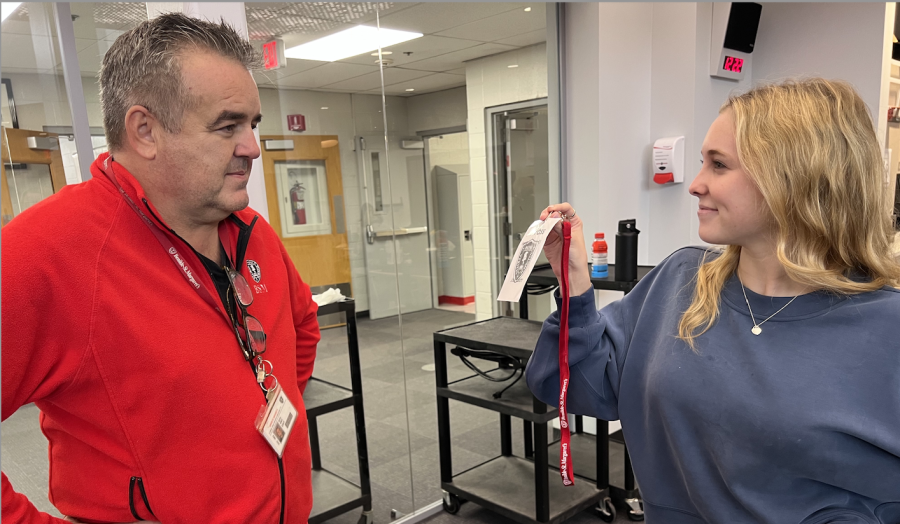Staff Ed: Hyperdiscipline Fosters Distrust Between Students and Administration
Hallway monitors and administrators ask to see hall passes whenever students are in the hallway.
So far this school year, BSM has changed rules regarding a wide variety of student activities. From requiring passes at all times to banning students from eating during class time, these new rules foster an atmosphere of disrespect and distrust for both students and teachers.
Administrators have sold these restrictions as the “return to normalcy” after two years of lenient Covid restrictions. But is this really “normal?” Should it be?
The effectiveness and necessity of the new policies can be debated. Some teachers might notice issues with students missing class; other teachers might think the hassle of reinforcing the rules is greater than the issue itself. Whatever the stance, an attitude of respect for students shouldn’t be up for debate.
From both personal experience and by observing others, the KE staff has watched incredulous administrators demand to see hall passes, ask for teacher emails, and march students back to class. This year, it feels like their first response is always distrust, even if they have no reason to doubt a student.
At first, these restrictions were relatively staggered by grade level. Freshmen were required to sit in a class room for their free hour, sophomores and juniors could work in the cube, library or commons, and seniors could leave campus if they had 1st, 2nd, 7th, or 8th hour free. But not all seniors have the beginning or end of the day free, so they are subject to the same rules as underclassmen, even after four years of building trust.
The arbitrariness of some of the rules also factors into this sense of distrust. When the administration changes rules, they often don’t offer explanations as to why the rules are different. The only explanation given for these changes was that the administration wanted to return to pre-pandemic policies. They didn’t offer statistics or justification for why these pre-pandemic rules were more effective. The KE staff believes that students and teachers would be more receptive for the rules if they understood the reasoning behind them. Do they help kids succeed academically? Do they prevent safety concerns? Or are they really only implemented because that is what we’ve always done?
Furthermore, communication should always be prioritized when enforcing new rules. Administrators know that few students sit down to read the student handbook; they need to do a better job of highlighting important changes and rules for the year. They tried to do this with class meetings the first day of school, but the chaos of fitting the entire grade in a small space rendered the meetings ineffective. Additionally, rules like “no going to the lunchroom during class” were only introduced a few weeks ago. The best way to communicate with students is to send a schoolwide email blast and follow up over morning announcements if necessary.
However, even if the rules are communicated well, the central concern is that enactment and enforcement of the rules is based on suspicion. This distrust doesn’t only apply to students. If the administration is questioning students every time they are in the hallway (even with a teacher’s pass), they are implying that they don’t trust the teacher to keep track of his or her own students.
The policy places burdens on teachers as well. Although supervision has been a required part of teachers’ work days since long before the pandemic, many teachers feel that this year, supervision has become an increasingly central part of their jobs. With the stricter policies, teachers must devote more time and attention to discipline, detracting from the arguably more important parts of their job.
While the distrust inherent to the current policy creates an “us vs them” mentality, allowing students a voice in the rule-making process develops a system based on mutual respect and trust. Ideally, students could give insight into how they felt about past rules before new ones were introduced. Although consulting with the student council is a good start, the council is not necessarily representative of the entire student body. Student council subcommittees, new this year, allow students not part of student council to give their input. However, there is no discipline or rules subcommittee.
In addition to preparing students academically, a primary goal of a college prep school is to bridge the gap between the rigid structure of middle school and enormous freedom in college. By cracking down on discipline this year, especially during free hour, BSM isn’t letting students develop the study habits and time management skills they need beyond high school.
It isn’t necessary that we return exactly to “normal.” BSM’s student body now is entirely composed of students who haven’t experienced a “regular year” of high school. So even if these rules are similar to pre-pandemic ones, they are new to students.
With these new students, BSM had a chance to create a new normal, potentially one that worked better than before. The administration could have worked with students to develop policies founded on mutual trust that combine the freedom of past years with pre-covid procedures. Instead, they created a hyper-disciplinary system that also creates an atmosphere of distrust. This distrust only disempowers students and prevents them from buying into the new policies.






































![Teacher Lore: Mr. Hillman [Podcast]](https://bsmknighterrant.org/wp-content/uploads/2025/03/teacherlorelogo-1200x685.png)




